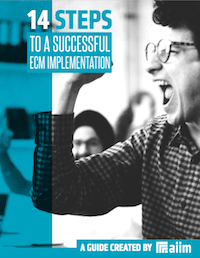The AIIM Blog
Keep your finger on the pulse of Intelligent Information Management with industry news, trends, and best practices.
Content Migration | Electronic Records Management (ERM)
Information has transformed in a big way over the past few decades, with some of the most significant changes coming in just the last five years. Year over year, information has seen a dramatic increase in both value and volume. The advancement of new technology has transitioned much of this from paper to digital – which presents its own set of new challenges regarding compliance, access, and protection. These changes all add up and have had a profound impact on how we create, manage, store, and access information today. Here at AIIM, we see this as an opportunity. We believe this means the practice of managing information and records can no longer be seen as solely an exercise for compliance – it needs to go beyond compliance and a key component in your business strategy.
Share
Electronic Records Management (ERM) | Intelligent Information Management (IIM)
How many times have you left a joint meeting of members of your organization's Information Management (IM) and IT teams thinking that everyone was on the same page, only to find out a few days later that the decisions your colleagues in the "other" unit took away were totally different from what your unit did? It happens more often than we think. And when it does happen, we should consider ourselves lucky if it takes only a few days for the inconsistent understanding to surface. The tough cases are those when the misunderstanding doesn't come to light for weeks or even months.
Share

Making an ECM implementation successful requires planning and attention to detail. The best way to create the right solution is to identify organizational goals and priorities. Learn how to manage a successful implementation in our free guide.
Electronic Records Management (ERM)
What is the value of Records and Information Management? To help answer that, take a quick mental inventory of all the technologies your organization utilizes that interact in some way with organizational information. Think about technology like email, personal computers, the web, smart phones, social media, etc. Think about all of the information captured, stored, and created using those technologies.
Share
Electronic Records Management (ERM)
Records can be vital to the business. That means the management of records is something that needs great care, attention, and planning. Although not a new concept, the game has somewhat changed in recent years as the way records are created and what is considered a record has evolved. Virtually all new records are created electronically today – they are what we call “born digital.” Whether a record is in the format of a letter, an email, fax, a web, or other transaction, the chances are today that it originally was created with one or more computers. This is a situation that has crept up on us relatively fast and unnoticed by some organizations in records management terms at least.
Share
Automation | Electronic Records Management (ERM) | Information Governance
When the dominant terminologies to describe a problem change, there is often a corresponding confusion in the roles that individuals play. In the broader content space, we experienced some of this disorientation as the core language used shifted from “ECM” to “Content Services,” and then with the incorporation of “Content Services” into the broader framework of “Intelligent Information Management.” This same terminology disorientation has been true in the governance arena as well, with varying uses and interpretations of “Records Management” and “Information Governance.” The confusion has left some organizations asking, “Do we need Records Managers, or do we need Information Governance professionals?”
Share
Automation | Electronic Records Management (ERM) | Information Governance
Before we start, let’s take a minute to address the big elephant in the room. You’re probably thinking, “Where are you going with this sales angle, Sean? I work with records and information, and my job is all about managing, protecting, and storing it. I don’t sell a thing!” Well, what we’re going to cover today will show you that you ARE, in fact, in the business of selling when it comes to Information Governance – it’s just a slightly different model than we’re all used to. In this selling model, we’re not exchanging goods and services for money; we’re exchanging ideas for acceptance.
Share